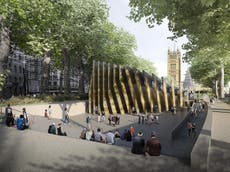London Holocaust memorial would be seen as ‘trophy’ for terrorists, inquiry warned, as Cabinet minister reveals he received death threats over plans
Robert Jenrick given police protection following antisemitic abuse

Your support helps us to tell the story
From reproductive rights to climate change to Big Tech, The Independent is on the ground when the story is developing. Whether it's investigating the financials of Elon Musk's pro-Trump PAC or producing our latest documentary, 'The A Word', which shines a light on the American women fighting for reproductive rights, we know how important it is to parse out the facts from the messaging.
At such a critical moment in US history, we need reporters on the ground. Your donation allows us to keep sending journalists to speak to both sides of the story.
The Independent is trusted by Americans across the entire political spectrum. And unlike many other quality news outlets, we choose not to lock Americans out of our reporting and analysis with paywalls. We believe quality journalism should be available to everyone, paid for by those who can afford it.
Your support makes all the difference.The construction of a national Holocaust memorial next to the Houses of Parliament would create a “trophy site” for a terror attack, an inquiry into the plan has been told.
Meanwhile, a cabinet minister has revealed his family received death threats and antisemitic abuse over his involvement in the plan.
On Monday, a High Court judge ruled Mr Jenrick had acted entirely properly over the application for the memorial following a legal challenge by the London Historic Parks and Gardens Trust.
Speaking to The Jewish Chronicle, Mr Jenrick said “baseless and disgraceful” allegations had been made against him.
“The behaviour of some of the opponents to the memorial has been shocking and disgraceful,” he said. “The fact that I have been subjected to these smears, and my family to antisemitic abuse and death threats only shows the paramount importance of the memorial”.
The paper said Mr Jenrick had been given protection from counter terror police after threats were made to burn down his home and kill his family.
Plans for the building of the Holocaust memorial in Westminster have the support of more than 170 MPs and peers.
The cross-party group of politicians said the new monument and accompanying museum would “stand as a testimony to the need for each one of us to stand up and tackle hatred, intolerance and injustice”.
It is also backed by the prime minister, Boris Johnson, and leader of the opposition, Sir Keir Starmer.
However, Lord Carlisle, the former independent reviewer of terror laws, warned the inquiry into the plan, which opened on Tuesday, that it poses a terrorism risk.
In written evidence, he said: “From my extensive experience of observing, analysing and discussing terrorism issues with front-line practitioners, I have absolutely no doubt that the proposed site raises a clear - indeed self-evident - terrorism risk.
“I give this warning with regret, but with total conviction. This would be a threat to the public, and also a potential threat to Parliament.”
Lord Carlisle told the BBC the issue was personal to him.
“I have a strong interest in this,” he said. "Many of my close relatives were exterminated in the Holocaust. My half-sister's mother was murdered in Auschwitz.
“I am absolutely determined that this should be remembered properly. I just feel that this isn't the right place for it.”
He added: “This site would also be, potentially, a target for right-wing extremists. It seems to be foolish for these two iconic places to be on the same broad site.
“International terrorists usually want to make a splash. Having a site which combines the Houses of Parliament and the new British Holocaust memorial seems to me to be asking for trouble.”
The Royal Parks Foundation, which manages the gardens, has also raised objections to the proposal, citing the “impact it will have on a popular public amenity space in an area of the capital with few public parks”.
The foundation said it “strongly supports” the principle of the plan but believes the design would have “significant harmful impacts” on the “character and function” of the park.
The memorial will feature 23 large bronze fin structures and an underground learning centre.
The government announced the project in 2016 and the design was chosen following a public competition.
However, a group of 42 Holocaust academics have also raised concerns about the centre, saying it could portray Britain as “the ultimate saviour of the Jews”.
In a joint letter to the inquiry, they said: “Situating the UK Holocaust memorial next to the Houses of Parliament is likely to create a celebratory narrative of the British government's responses to the Jewish catastrophe during the Nazi era and beyond.”
The final decision on the plans is expected to be taken by Christopher Pincher, housing minister at the Ministry of Housing, Communities and Local Government, after the inquiry concludes at the end of this week.



Join our commenting forum
Join thought-provoking conversations, follow other Independent readers and see their replies
Comments